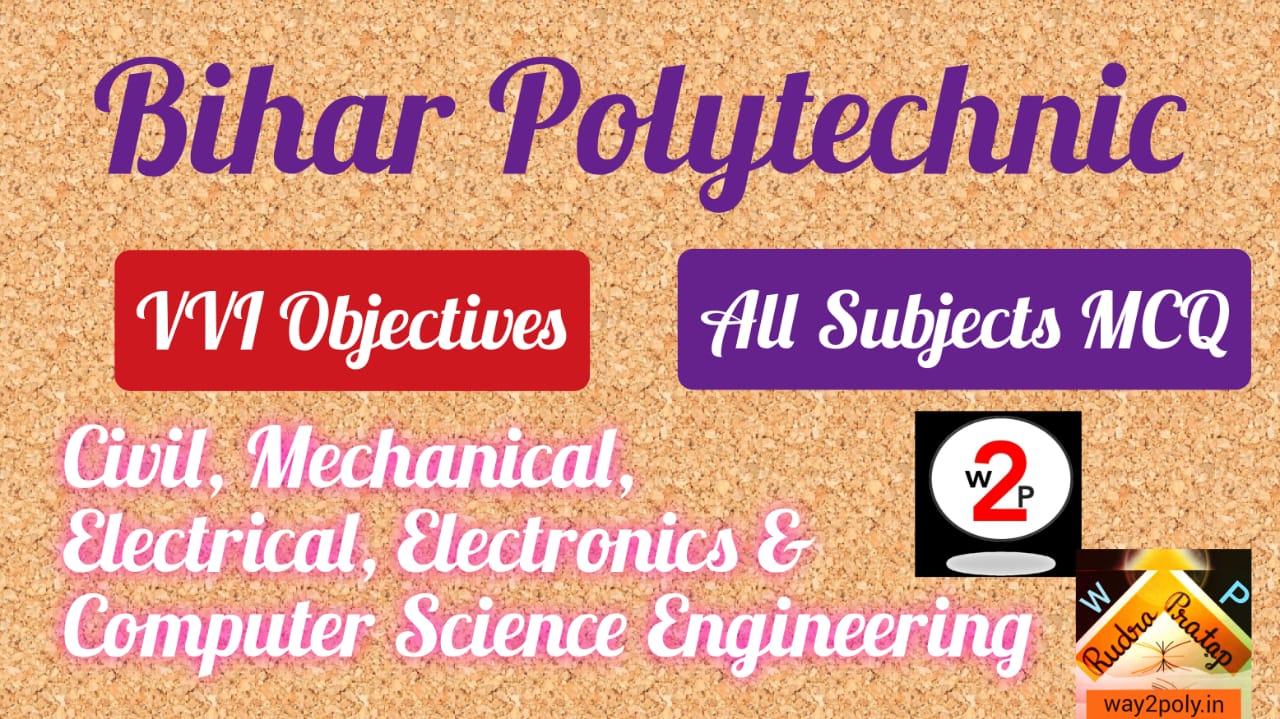Bihar Polytechnic All Branch & all Semester MCQs
 |
| Bihar Polytechnic MCQ |
In this article, I am going to provide MCQ questions of all the branches of Bihar Polytechnic, which will be specially for all the subjects of all the semesters related to Civil Engineering, Computer Science Engineering, Electrical Engineering, Electronics Engineering and Mechanical Engineering. You all are requested to read it and prepare well for semester exams and also share this article with your friends as much as possible.
MCQs at Bihar Polytechnic cover a wide variety of subjects including Mathematics, Physics, Chemistry, Engineering fundamentals and domain-specific topics. They evaluate students' proficiency in fundamental principles, analytical abilities, and application of theoretical knowledge in practical scenarios. By mastering MCQs, students develop critical thinking skills, enhance problem-solving abilities, and deepen their understanding of core concepts in their chosen fields.
Follows Our Social Media for Latest Update
| Telegram | Join |
| Youtube | Subscribe |
| Polytechnic Point | Subscribe |
| Facebook [SBTE] | Follow |
- Download Our Way to Polytechnic App to get all Study Material and Video Lectures of Diploma Courses.
1st Year all branch MCQs
https://sbte.way2poly.in/2024/02/bihar-polytechnic-1st-and-2nd-semester.html
Civil Engineering all Semester MCQ
Electrical Engineering all Semester MCQ
Electronics Engineering all Semester MCQ
Computer Science Engineering all Semester MCQ
Mechanical Engineering all Semester MCQ
https://sbte.way2poly.in/2024/02/mechanical-engineering-all-subjects-mcqs.html
Advantages of MCQ
Multiple Choice Questions (MCQs) offer several advantages:
1. Efficiency: MCQs are efficient tools for assessing a large volume of content in a relatively short amount of time. They allow instructors to cover a wide range of topics and evaluate students' understanding comprehensively within the constraints of a single test or exam session. 2. Objective Evaluation: MCQs provide an objective method of evaluation, reducing the potential for bias or subjectivity in grading. Since there is typically only one correct answer per question, grading can be standardized and consistent across different examiners. 3. Clarity of Expectations: MCQs clearly outline the expectations for students. Each question presents a specific problem or scenario, and students must select the most appropriate answer from the provided options. This clarity helps students understand the scope of the assessment and focus their preparation accordingly. 4. Assessment of Higher-order Thinking: While MCQs are often associated with testing factual knowledge, well-designed MCQs can also assess higher-order thinking skills such as analysis, synthesis, and evaluation. By incorporating complex scenarios, application-based questions, and critical thinking challenges, MCQs can measure students' ability to apply knowledge to real-world situations. 5. Time Management: MCQs encourage effective time management skills among students. Since there is a limited amount of time to complete the exam, students must prioritize questions, allocate time appropriately, and manage their pace throughout the test duration. 6. Immediate Feedback: MCQs allow for immediate feedback on students' performance. After completing an MCQ-based assessment, students can quickly review their answers and compare them to the correct responses. This immediate feedback helps students identify areas of strength and weakness, allowing them to adjust their study strategies accordingly. 7. Reduced Guessing Bias: MCQs typically include multiple distractors or incorrect options alongside the correct answer. This reduces the likelihood of students guessing the correct answer by chance and encourages them to demonstrate genuine understanding of the material. 8. Scalability: MCQ-based assessments are scalable and adaptable to different class sizes and educational contexts. Whether used in small classroom quizzes or large-scale standardized tests, MCQs can accommodate varying levels of complexity and facilitate efficient grading processes. 9. Accessibility: MCQs can be administered in a variety of formats, including paper-based tests, online assessments, and computer-adaptive exams. This flexibility enhances accessibility for students with diverse learning needs and accommodates different modes of learning and assessment. 10. Data Analysis: MCQ-based assessments generate valuable data for analysis and evaluation. By analyzing student performance on individual questions, instructors can gain insights into areas of curriculum strength and weakness, identify misconceptions or gaps in understanding, and inform instructional planning and remediation strategies.
Some Multiple Choice Questions of Bihar Polytechnic:
1. Which of the following is a noble gas?
a) Hydrogen
b) Oxygen
c) Nitrogen
d) Helium
2. What is the chemical formula for water?
a) H2O
b) CO2
c) NH3
d) CH4
3. The SI unit of electric current is:
a) Volt
b) Ampere
c) Ohm
d) Watt
4. Which of the following is a primary color in the RGB color model?
a) Red
b) Yellow
c) Cyan
d) Magenta
5. What is the chemical symbol for iron?
a) Fe
b) Au
c) Ag
d) Pb
6. Which planet is known as the "Red Planet"?
a) Mars
b) Venus
c) Jupiter
d) Saturn
7. The process of converting a liquid into vapor is called:
a) Condensation
b) Sublimation
c) Evaporation
d) Melting
8. What is the chemical symbol for potassium?
a) K
b) P
c) Ka
d) Ko
9. The atomic number of carbon is:
a) 6
b) 8
c) 10
d) 12
10. Which of the following is a greenhouse gas?
a) Oxygen
b) Nitrogen
c) Carbon dioxide
d) Hydrogen
Answers of (MCQs):
1. d) Helium
2. a) H2O
3. b) Ampere
4. a) Red
5. a) Fe
6. a) Mars
7. c) Evaporation
8. a) K
9. a) 6
10. c) Carbon dioxide




















No comments:
Post a Comment